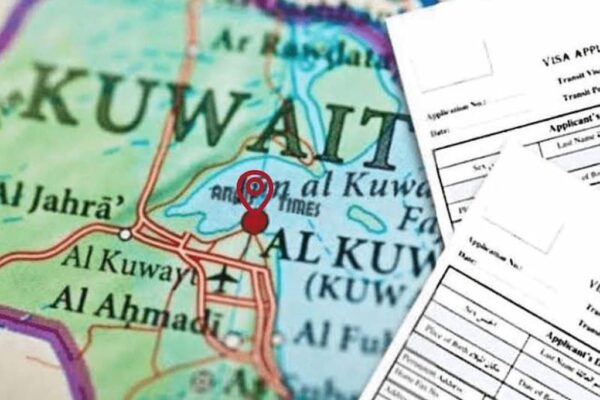Are you thinking about moving to Kuwait? Whether you're chasing new career opportunities, reuniting with your family, or just curious about life in the Gulf, knowing the Kuwait immigration process is very important. The country is known for its modern lifestyle, strong economy, and cultural richness, but getting there involves more than just booking a flight. From visas and work permits to residency rules and legal procedures, there's a lot to navigate. Here, we break it all down so you can approach your move with confidence. Excited to find out what you need to do to move to Kuwait and call it home? Let's dive into the details.
Kuwait Entry Requirements
All other travelers, except for citizens of the Gulf region, require a visa permit to enter Kuwait. If you have the necessary visa, you can enjoy your time in Kuwait without worry. Kuwait's immigration system operates on sponsorship, just like Bahrain's. Therefore, visitors must be sponsored by a Kuwaiti national or company to obtain a Kuwait visa. If you intend to live and work in Kuwait, you will also need a residency visa. Furthermore, a male foreigner can sponsor his spouse and kids to live with him in Kuwait after obtaining a residency visa.
Types of Visas for Kuwait Immigration
Kuwait offers various visa options catering to different purposes and durations of stay. Here are the available visa options:
1. Visitor Visas
The duration of a Kuwaiti visit visa is up to 30 days. If you stay longer than this, you will be fined 10 KWD every day, which you must pay before you may leave the country. Nationals of 70 countries, including the United States and all EU member states except Australia, Croatia, and Japan, are issued entrance visas upon arrival in Kuwait. If you fall into this category, you can visit Kuwait without obtaining a visa. You can use the Embassy Finder website to see if you belong to one of these nationalities. Those in Kuwait on visitor visas are not permitted to work.
2. Work Permits & Residency Visas
Foreign citizens must get a residence visa (iqama) to live and work in Kuwait. This is important for anyone wishing to start their Kuwait immigration journey for employment purposes. One must understand the steps to take to apply for a Kuwait work visa before embarking on this process. Only a legitimate employment offer from a private enterprise or a Kuwaiti government agency may be used to grant this visa. After that, the Kuwaiti employer submits an application for the iqama on the foreign worker's behalf.
Following that, you will get a “No Objection Certificate” (NOC), which permits you to enter Kuwait. The real residency visa will be given to you after you arrive in Kuwait. The issuance of the resident visa requires a comprehensive medical certificate that includes hepatitis, HIV/AIDS, and tuberculosis testing. After receiving the residency visa, you can apply for a Kuwaiti civil ID, also known as a bitaqa-almadaniyah. This application must be submitted within thirty days of acquiring the resident visa.
3. Dependent Visas
Kuwait immigration is possible for anyone with a male relative in the country. After obtaining residency, a male foreign national can sponsor his spouse and kids to remain with him while he works in Kuwait. However, there are wage limits that limit this possibility. Only foreign workers who make at least 650 KWD a month (or 450 KWD if the government employs them) can bring their family along. Residence permits and dependent visas follow a similar process.
When you arrive in Kuwait, you will receive your official visa. Dependents are also required to go through the same medical exams. In a patriarchal turn of events, female foreigners are not allowed to sponsor their spouses. Additionally, sons older than 21 are not eligible for sponsorship; however, this regulation does not apply to parents or adult daughters. Additionally, any dependents who wish to work in Kuwait will require a separate work visa from a Kuwaiti sponsor.
Documents Required for Kuwait Visa Application

Foreign nationals must have the following travel documents to apply for a Kuwait visa and residency permit:
- Original passport
- Visa application form
- Passport photographs
- Proof of status
- Birth certificate
- Proof of sufficient funds
- Invitation letter
- Health certificate
- Proof of a clear criminal record
- Proof of travel insurance
- Police clearance certificate
How to Apply for a Kuwait Visa
This is one of the most critical steps in your Kuwait immigration journey. The government has made obtaining a Kuwaiti visa easy for travelers. Kuwait now offers an electronic visa for nationals of select countries and Gulf Cooperation Council (GCC) residents. You can apply for the Kuwait e-visa on the official website.
Residents of the GCC nations of Qatar, Oman, Saudi Arabia, and Bahrain are eligible to apply for a Kuwait e-visa. Indian citizens can apply for the e-visa for Kuwait with a residency card from any of the GCC countries. If you're in any of these categories and are aware of the visa requirements, you can go ahead by following these steps:
- Find the Kuwait embassy/consulate in your country or residence
- Get the visa application form
- Fill out the application form and attach the necessary documents
- Pay the visa fee
- Await the approval and processing of the visa.
Visa Fees and Processing Time
The Kuwait visa costs 3 KWD, while the dependent and work visas cost between 100 KWD and 200 KWD. The Evisa takes about 2 business days to process, while the work and dependent visas take 8 to 10 days.
Important Information About the E-visa
There are a few factors to consider before applying for this visa, which we will describe below.
1. Use approved routes: Although the visa permits you to enter Kuwait, you must follow the authorized routes. For example, transit travelers can only enter and exit Kuwait via the airport. If you take an unapproved route, you may be refused access.
2. Not for residency or work: This visa is not for employment or permanent residency. The government permits foreign nationals who fulfill specific requirements to work or settle in the nation, but only with a work or residency visa. You can apply for the Kuwaiti e-visa at the Kuwaiti embassy or consulate in your country, even though an e-visa won't allow you to do both.
3. Traveling with minors: When traveling with kids, you must provide additional documentation to prove that you are the legal guardian or parent. Parents must produce authentic birth certificates, and guardians must give a notarized letter confirming parental approval.
4. Non-refundable fee: Applying for a visa requires using a payment (credit or debit) card instead of cash. It's also crucial to remember that this cost is non-refundable and does not ensure that your visa application will be accepted. The cost is for processing purposes only.
How to Get a New Accommodation in Kuwait
When your Kuwait immigration becomes successful, the next thing is to secure accommodation. It's never easy to find a temporary residence that works. However, Kuwait is easier for expatriates than many other places. There is no shortage of high-quality accommodation, and most landlords are happy to rent to foreigners.
Private schools and major international corporations typically provide housing options for expatriate staff. The relevant HR department or your employer often helps you start your search. Here are some tips to help you find your ideal Kuwaiti home:
- Speak with a local real estate agent.
- Ask friends, coworkers, and other foreigners; word-of-mouth referrals are the most trustworthy in Kuwait.
- Check out one of the English-language local newspapers, such as the Arab Times or the Kuwait Times.
- Look up real estate listings online.
- Ask about availability when you visit apartment buildings or compounds; you might be lucky enough to learn that an apartment will shortly be vacated.
Benefits of Moving to Kuwait
1. Job Opportunities
Kuwait's oil-rich economy offers numerous employment opportunities in sectors like healthcare, construction, finance, and oil and gas, making it a popular destination for foreign professionals in all fields.
From engineering to education, Kuwait's focus on major development-promoting projects and a large pool of highly qualified local workers provides many opportunities for foreign workers to work in successful industries. So it doesn't matter which Kuwait city you move to, there's an opportunity waiting for you.
2. Rich Cultural Heritage
Kuwait has a luxurious traditional history, including a rich legacy of art, music, and literature. This allows individuals to understand and appreciate the country's cultural riches. Getting to know history is fascinating, from seaside souks selling traditional arts and crafts to vintage goods highlighting Kuwait's pearl-diving cultural heritage.
3. Safety and Security
Kuwait is known worldwide for its safety and peacefulness. Its low crime rates and advantageous political atmosphere give people and their families peace of mind. Kuwait maintains extraordinary peace and security for its residents despite regional geopolitical turmoil because of its strict internal safety regulations. Furthermore, Kuwaiti citizens are quite peaceful and accommodating, so expats may enjoy peace of mind.
4. Healthcare Facilities
Kuwait immigration opens doors to great medical treatment. The ountry has the latest healthcare systems, with first-rate medical services and cutting-edge medical facilities. Residents have access to complete medical care when necessary. Kuwait's healthcare system is one of the most highly technological in the Gulf, with contemporary private facilities, affordable practices, and trained doctors. Many employers provide medical insurance benefits.
5. High Standard of Living
Kuwait has a very high standard of living, with trendy amenities, spectacular shopping malls, and state-of-the-art infrastructure that enables people to live comfortably. Due to Kuwait's suitable economy and significant oil reserves, expats can enjoy very high living standards that continue to rank among the highest in the Gulf.
Conclusion
Kuwait immigration can open doors to new experiences, but requires careful planning and awareness of local regulations. By understanding the process and preparing ahead, you'll be better equipped for a smooth transition. Whether for work, family, or adventure, Kuwait offers opportunities worth exploring. Start your journey with confidence today.
















